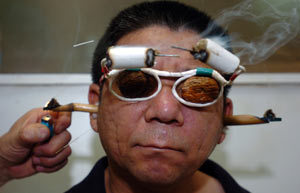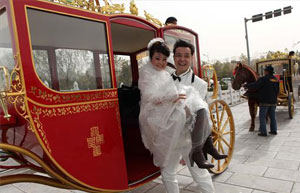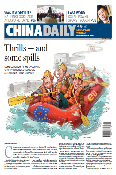'Cut off head of snake', Saudis told US on Iran
Updated: 2010-11-29 09:08
(Agencies)
WASHINGTON - King Abdullah of Saudi Arabia repeatedly exhorted the United States to "cut off the head of the snake" by launching military strikes to destroy Iran's nuclear program, according to leaked US diplomatic cables.
A copy of the cable dated April 20, 2008, was published in the New York Times website on Sunday after being released by the whistleblowing website WikiLeaks. The classified communication between the US Embassy in Riyadh and Washington showed the Saudis feared Shi'ite Iran's rising influence in the region, particularly in neighboring Iraq.
The United States has repeatedly said that the military option is on the table, but at the same time US military chiefs have made clear they view it as a last resort, fearing it could ignite wider conflict in the Middle East.
The April 2008 cable detailed a meeting between General David Petraeus, the top US military commander in the Middle East, and then US ambassador to Iraq, Ryan Crocker, and King Abdullah and other Saudi princes.
At the meeting, the Saudi ambassador to the United States, Adel al-Jubeir "recalled the King's frequent exhortations to the US to attack Iran and so put an end to its nuclear weapons program," the cable said.
"He told you to cut off the head of the snake," Jubeir was reported to have said.
The Saudi foreign minister, Prince Saud al-Faisal, however, pushed for tougher sanctions instead, including a travel ban and further restrictions on bank lending, although he did not rule out the need for military action.
The WikiLeaks documents also show US Defense Secretary Robert Gates believes any military strike on Iran would only delay its pursuit of a nuclear weapon by one to three years, the Times reported.
"IRAN NUCLEAR PROGRAM MUST BE STOPPED"
Saudi Arabia, one of the world's top oil producers, is concerned about Iran's growing military strength. The United States announced last month that it plans to sell the kingdom $60 billion worth of military aircraft to help it bolster its defenses.
Britain's Guardian newspaper, one of a number of publications to have had access to the leaked diplomatic cables, said the communications also showed that other Arab allies have secretly agitated for action against Tehran over its disputed nuclear program.
Another cable, sent from the US Embassy in Manama, Bahrain, on November 4, 2009, detailed a meeting between Petraeus and King Hamad bin Isa al-Khalifa, whose kingdom is the headquarters of the US Navy's Fifth fleet. Like Saudi Arabia it is a Sunni Muslim-ruled kingdom.
King Hamad argued "forcefully for taking action to terminate (Iran's) nuclear program, by whatever means necessary," the cable said.
"That program must be stopped," he was quoted as saying. "The danger of letting it go on is greater than the danger of stopping it."
According to an April 2006 cable from the US embassy in Abu Dhabi, the United Arab Emirates believed "the threat from al Qaeda would be minor if Iran has nukes," but that it was reluctant to take any action that might provoke its neighbor.
The emirate's rulers told US officials they should only seek their help as a "very last resort. If you can solve something without involving the UAE, please do so," the cable said.
Iran denies its nuclear program is a cover to build a nuclear bomb and says it is purely for peaceful purposes.
A UN Security Council resolution passed in June, imposing a fourth round of sanctions, renewed a call on Iran to suspend uranium enrichment, something Tehran has explicitly refused to do, saying such activity is its right under international law.
The top US military officer, Admiral Mike Mullen, said in comments released on Friday that the US military has been thinking about military options on Iran "for a significant period of time", but he stressed that diplomacy remained the focus of US efforts.
Paper's Digest

China bags Asiad team tennis title after 24 yrs
Wimbledon semifinalist Li Na led host China to capture the team tennis title on Tuesday at the Asian Games, accomplishing her Asiad tour with three consecutive victories.
China rate rises no panacea to curb inflation: PBOC adviser
Specials

Russian possessed with TCM
Born into a family of doctors, Maxime became interested in Traditional Chinese Medicine (TCM) at the age of 12, after hearing about TCM theories such as health preservation and recuperation.

Acupuncture takes stab at UNESCO list
Acupuncture and Peking Opera have been selected as candidates for UNESCO intangible cultural heritage status.

The wedding coach comes back to life
A groom carries his bride from a wedding coach in Xuchang, Henan province, Nov 11, 2010. Produced a local factory, various original hand-made wedding carriages were displayed on the streets, attracting young people chasing fashion and an environment-friendly lifestyle.
